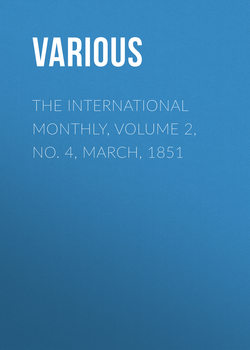Читать книгу The International Monthly, Volume 2, No. 4, March, 1851 - Various - Страница 12
JOHN JAMES AUDUBON
ОглавлениеBy Rufus W. Griswold
"Formerly," said Baron Cuvier, in a report to the Royal Academy of Sciences in Paris, "European naturalists had to make known her own treasures to America; but now her Mitchells, Harlans, and Charles Bonapartes, have repaid with interest the debt which she owed to Europe. The history of the American birds by Wilson, already equals in elegance our most beautiful works in ornithology, and if ever that of Audubon be completed, it will have to be confessed that in magnificence of execution the Old World is surpassed by the New." The work of the "American backwoodsman" thus alluded to, has long been completed; the great Cuvier subsequently acknowledged it to be "the most splendid monument which art has erected in honor of ornithology;" and the judgment of mankind has placed the name of our countryman first in the list of authors and artists who have illustrated the beautiful branch of natural history to which he has devoted so large a portion of his long and heroic life.
John James Audubon was born in Louisiana about the year 1782. He was of French descent, and his parents perceiving early the bent of his genius sent him to Paris to pursue his education. While there he attended schools of natural history and the arts, and in drawing took lessons from the celebrated David. He returned in his eighteenth year, and his father soon after gave him a farm near Philadelphia, where the Perkioming creek falls into the Schuylkill. Its fine woods offered him numerous subjects for his pencil, and he here commenced that series of drawings which ultimately swelled into the magnificent collection of The Birds of America. Here too he was married, and here was born his eldest son. He engaged in commercial speculations, but was not successful. His love for the fields and flowers, the forests and their winged inhabitants, we readily suppose unfitted him for trade. At the end of ten years he removed to the west. There were then no steamboats on the Ohio, and few villages and no cities on its shores. Reaching that noble river in the warm days of autumn, he purchased a small boat in which, with his wife and child and two rowers, he leisurely pursued his way down to Henderson, in Kentucky, where his family resided several years. He appears at first to have engaged in commerce, for he mentions his meeting with Wilson, of whom till then he had never heard, as having occurred in his counting-room in Louisville in the spring of 1810. His great predecessor was procuring subscriptions for his work. He called on Audubon, explained the nature of his occupations, and requested his patronage. The merchant was surprised and gratified at the sight of his volumes, and had taken a pen to add his name to the list of subscribers, when his partner abruptly said to him in French, "My dear Audubon, what induces you to do so? your own drawings are certainly far better, and you must know as much of the habits of American birds as this gentleman. "Wilson probably understood the remark, for he appeared not to be pleased, and inquired whether Audubon had any drawings of birds. A large portfolio was placed upon the table, and all its contents exhibited by the amateur ornithologist. Wilson was surprised; he had supposed he was himself the only person engaged in forming such a collection; and asked if it was intended to publish them. Audubon replied in the negative: he had never thought of presenting the fruits of his labors to the world. Wilson was still more surprised; he lost his cheerfulness; and though before he left Louisville Audubon explored with him the neighboring woods, loaned him his drawings, and in other ways essayed to promote his interests and happiness, he shook the dust from his feet when he departed, and wrote in his diary that "literature or art had not a friend in the place." Far be it from me to write a word in dispraise of Alexander Wilson. He was a man of genius, enthusiasm, and patient endurance; an honor to the country of his birth, and a glory to that of his adoption; but he evidently could not bear the thought of being excelled. With all his merits he was even then greatly inferior to Audubon, and his heart failed him when he contrasted the performances which had won fame for him with those of the unknown lover of the same mistress, Nature, whom he thus encountered.
